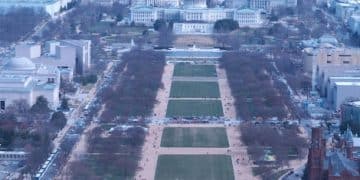Key Challenges for US Diplomats in Eastern Europe: A Geopolitical Analysis

US diplomats in Eastern Europe face significant challenges in the current geopolitical climate, including navigating complex relationships with Russia, supporting democratic institutions amid rising authoritarianism, and addressing economic and security concerns heightened by regional conflicts and energy dependencies.
The role of US diplomats in Eastern Europe has become increasingly critical and complex. Understanding what are the key challenges facing US diplomats in Eastern Europe in the current geopolitical climate is crucial to shaping effective foreign policy and maintaining stability in the region.
Navigating a Complex Geopolitical Landscape
Eastern Europe presents a unique set of challenges for US diplomats due to its historical ties, ongoing conflicts, and the pervasive influence of external actors such as Russia and China. Understanding this backdrop is essential for crafting effective diplomatic strategies.
The Legacy of the Cold War
The Cold War left a lasting impact on Eastern Europe, shaping political alliances and creating deep-seated distrust. US diplomats must navigate this legacy while promoting democracy and stability.
Russia’s Influence
Russia’s continued interest in the region, often manifested through political interference, cyber warfare, and energy dominance, presents a significant obstacle to US diplomatic efforts.
- Countering disinformation campaigns.
- Supporting energy independence initiatives.
- Strengthening democratic institutions against external manipulation.
These efforts require a deep understanding of local contexts and tailored strategies that resonate with the populations of each country.
In conclusion, navigating the complex geopolitical landscape of Eastern Europe requires US diplomats to understand the historical context, acknowledge Russia’s influence, and craft tailored strategies that promote democracy and stability while respecting local nuances.

Economic and Security Considerations
Economic dependencies and security vulnerabilities further complicate the role of US diplomats in Eastern Europe. These factors often intersect, creating intricate challenges that require innovative solutions.
Energy Dependence
Many Eastern European countries rely heavily on Russian energy, giving Russia significant leverage. US diplomats work to diversify energy sources and reduce dependence.
Security Threats
The ongoing conflict in Ukraine and other regional disputes have heightened security concerns in Eastern Europe. US diplomats play a crucial role in fostering cooperation and ensuring stability.
Addressing these intertwined economic and security considerations demands a multifaceted approach. US diplomats must promote economic diversification, strengthen security alliances, and address corruption to foster resilience in the region.
Promoting Democracy and Human Rights
A core mission for US diplomats in Eastern Europe is to promote democracy and uphold human rights. This involves supporting civil society, advocating for free and fair elections, and combating corruption.
Challenges to Democratic Institutions
Many Eastern European countries face challenges such as weak rule of law, corruption, and declining media freedom. US diplomats work to strengthen these institutions and promote transparency.
Supporting Civil Society
Civil society organizations play a vital role in promoting democracy and holding governments accountable. US diplomats provide support and protection to these groups.
The promotion of democracy and human rights often faces backlash from authoritarian regimes and vested interests. US diplomats must be prepared to navigate these challenges, working collaboratively with local activists and international organizations to advance these fundamental values.

Combating Corruption
Corruption remains a pervasive issue in many Eastern European countries, undermining democracy, hindering economic development, and eroding public trust. Effectively combating corruption is a critical challenge for US diplomats.
The Impact of Corruption
Corruption diverts resources, distorts markets, and undermines the rule of law. US diplomats work to expose corruption and promote good governance.
Strategies for Combating Corruption
US diplomats employ various strategies, including supporting independent media, strengthening anti-corruption agencies, and promoting transparency in government procurement.
- Supporting investigative journalism to uncover corrupt practices.
- Working with local governments to implement anti-corruption reforms.
- Promoting whistleblower protection laws.
Combating corruption requires a long-term commitment and a collaborative approach. US diplomats must work closely with local partners and international organizations to foster a culture of accountability and transparency.
Building Alliances and Partnerships
Building strong alliances and partnerships is essential for successful diplomacy in Eastern Europe. This involves working with NATO allies, EU members, and other like-minded countries to address common challenges.
NATO Allies
NATO plays a crucial role in providing security and stability in Eastern Europe. US diplomats work to strengthen NATO’s presence and capabilities in the region.
EU Members
Many Eastern European countries are members of the European Union, providing opportunities for cooperation on economic and political issues. US diplomats work to align US and EU policies in the region.
Effective diplomacy requires fostering trust and mutual understanding among partners. US diplomats must be adept at navigating complex relationships, addressing conflicting interests, and finding common ground to achieve shared goals.
Addressing Disinformation and Cyber Threats
Disinformation and cyber threats pose significant challenges to US diplomats in Eastern Europe. These tactics are often used to undermine democracy, sow discord, and interfere in elections.
The Spread of Disinformation
Disinformation campaigns can manipulate public opinion and create confusion. US diplomats work to counter these campaigns by promoting media literacy and supporting independent journalism.
Cybersecurity Concerns
Cyberattacks can disrupt critical infrastructure and steal sensitive information. US diplomats work with local governments to improve cybersecurity defenses.
Addressing disinformation and cyber threats requires a comprehensive approach that combines technological expertise, strategic communication, and international cooperation. US diplomats must stay ahead of these evolving threats, working collaboratively with partners to protect democratic values and critical infrastructure.
Adapting to Changing Geopolitical Realities
The geopolitical landscape is constantly evolving, requiring US diplomats to adapt and innovate. This involves staying informed about regional developments, anticipating future challenges, and developing flexible strategies.
Monitoring Regional Trends
US diplomats must closely monitor political, economic, and social trends in Eastern Europe to understand the underlying dynamics and anticipate potential crises.
Developing Flexible Strategies
Effective diplomacy requires the ability to adapt to changing circumstances and adjust strategies accordingly. US diplomats must be creative, resourceful, and resilient.
Adapting to changing geopolitical realities demands a proactive and forward-thinking approach. US diplomats must embrace innovation, cultivate strong relationships, and remain committed to promoting US interests and values in the face of evolving challenges.
| Key Aspect | Brief Description |
|---|---|
| 🇷🇺 Russia’s Influence | Countering disinformation and supporting energy independence are key. |
| 🛡️ Security Concerns | Addressing conflicts and strengthening alliances for regional stability. |
| 🏛️ Democracy Promotion | Supporting civil society and fair elections to combat corruption. |
| 🌐 Cyber Threats | Countering disinformation and enhancing cybersecurity defenses. |
Frequently Asked Questions
▼
The primary goal is to promote stability, democracy, and economic prosperity in the region, aligning with US foreign policy objectives and fostering strong relationships.
▼
They work to diversify energy sources, promote trade and investment, and support reforms that enhance economic resilience and reduce dependence on external actors.
▼
They support investigative journalism, strengthen anti-corruption agencies, and promote transparency in government to foster a culture of accountability.
▼
They promote media literacy, support independent journalism, and work with social media platforms to identify and remove sources of disinformation and propaganda.
▼
Strong alliances are essential for addressing common challenges, ensuring security, and promoting shared values, as well as for countering external threats effectively.
Conclusion
In conclusion, US diplomats in Eastern Europe face a complex and multifaceted set of challenges, ranging from navigating geopolitical tensions and promoting democracy to combating corruption and addressing disinformation. Successfully addressing these challenges requires a comprehensive approach that combines strategic vision, cultural sensitivity, and a commitment to building strong alliances and partnerships.





